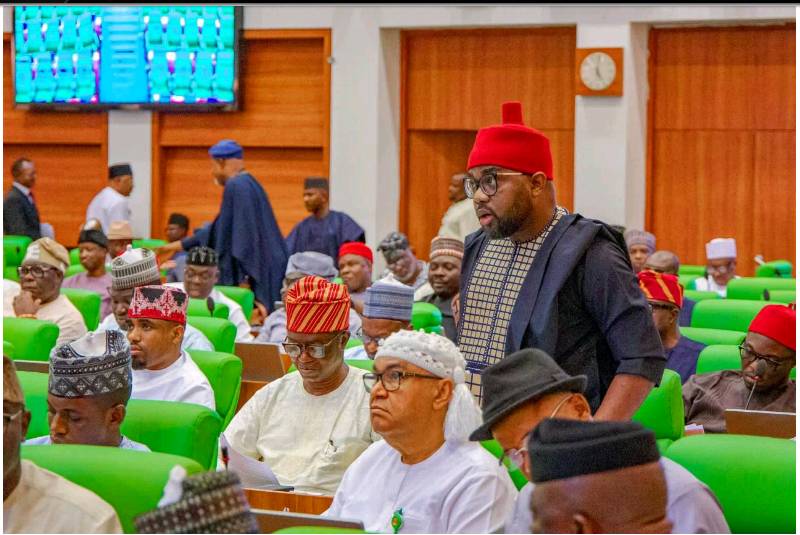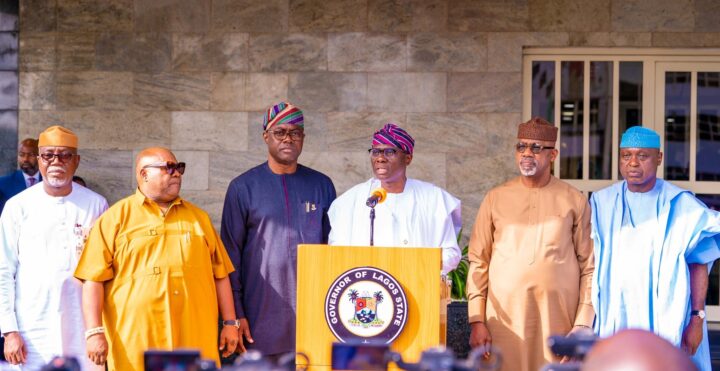File photo of Ikeagwuonu Ugochinyere
On Monday, 35 lawmakers from the Nigerian House of Representatives held a press briefing to announce six out of 50 constitutional draft bills they were proposing to reform Nigeria. Among other things, the group of lawmakers, are pushing for a single six-year tenure for the office of the president and state governors.
The group, led by Ikenga Ugochinyere, the People’s Democratic Party (PDP) lawmaker representing Ideato Federal Constituency of Imo state, referred to themselves as “The Reformers”. Announcing the reforms, the reformers (pun intended) said they are seeking a change in the law to allow electoral issues from an election to get sorted at the tribunal before a new president or governor is sworn in. This means, you cannot swear in Bola Tinubu as president, while Peter Obi is still in court, as was the case in the 2023 election.
In addition to this, they are also proposing that the country elects two vice presidents — one from the north, the other from the south. The first VP will be from wherever the president is from, while the second VP will be from the other region. For context, if the President is from the southwest, the first VP will be from the south, while the second VP will be from the north. Both VPs will have the status of a federal minister. Hence, any state producing a VP, cannot produce another minister.
The lawmakers are also proposing a zonal rotation of presidential and gubernatorial tickets within the country. In other words, if the president, as of the time the law is made, comes from the southwest, the next president will come from the northeast, northwest, or northcentral. After that northern president, the next one will come from the southeast or southsouth. Put simply, after the southwest produces a president, the presidency rotates within the other five geopolitical zones over the next thirty years, before coming back to the southwest.
Advertisement
At the state level, the governorship ticket will also rotate between the senatorial zones within the states. So, for Kogi and Benue state, the governor will not always be from certain regions. Ditto for all other states.
ELECTORAL REFORMS
The lawmakers are seeking the addition of iREV, or a derivative of it, to the legal framework around elections. They are also proposing that all elections — guber, presidential, LGA, and national assembly — be held on the same day. This, according to them, is to ensure an uptick in voter turnout while reducing the cost of elections and saving time.
They also propose that all pre-election matters must be sorted by law 30 days before the election, to ensure that the election petition tribunal does not have to deal with pre-election issues, such as the candidacy of a politician standing in an election.
Advertisement
By their new proposals, politicians who lose elections can sue the returning officer — not necessarily INEC — for wrong announcement of results. If found guilty, the electoral officer will be jailed for seven years, without the option of a fine.
GOODLUCK JONATHAN TRIED THIS
As I say about Nigeria, we are a country on auto-repeat; whatever you see today has happened before. In July 2011, former president Goodluck Jonathan called for constitutional amendments to allow the president and governors run for a single six-year tenure.
At the time, Jonathan’s spokesperson, Reuben Abati, said the president’s move was “borne out of a patriotic zeal, after a painstaking study and belief that the constitutionally guaranteed two terms for Presidents and Governors is not helping the focus of Governance and institutionalization of democracy at this stage of our development”.
Jonathan’s proposal was rejected on the basis the assumption that he was attempting to elongate his term as president. The bill died a natural death.
Advertisement
ENTER TINUBU’S 10-YEAR TENURE
I ran a quick profile of the 15 frontline lawmakers pushing this “reform” agenda and found that they are indeed from the three major parties — the Peoples Democratic Party, the All Progressives Congress and the Labour Party. So, this is a multiparty affair. Unlike the Jonathan years, this is not an executive bill.
However, history teaches us a few things, and in this case, the biggest lesson is that the lawmakers are preparing for a 10-year tenure for the current president and governors in his shoes.
Speaking on this same issue in 2013, Ike Ekweremadu, the former deputy senate president, said Jonathan’s bill was rejected because it meant that “instead of staying for 8 years” the president and governors at the time “will now stay for 10 years”. “I think it is better to make a sacrifice and allow the system to run than giving someone an extended tenure of 10 years,” Ekweremadu said.
So by precedent, the single-term conversation is not for the current governors or the president to serve from 2023 to 2029, it is for them to finish their existing term in 2027, and then run for a single term of six years.
Advertisement
Are you ready for a Tinubu 10-year tenure? If the answer is yes, you should support The Reformers and prepare for Tinubu until 2033. If your answer is no, then this is the time to rise against the proposal being made by this group of lawmakers. Or at best, add a caveat to the bill that no one serves more than eight years. In this case, governors in their second term will serve their 4-year second term, while those in their first term will have a single six-year tenure. This will dismantle an already scattered electoral calendar and cost the nation more in terms of electoral expenditure.
There is no win-win situation here. Correct me if I’m wrong.
Advertisement
You can reach Mayowa on social media @OluwamayowaTJ
Advertisement
Add a comment







